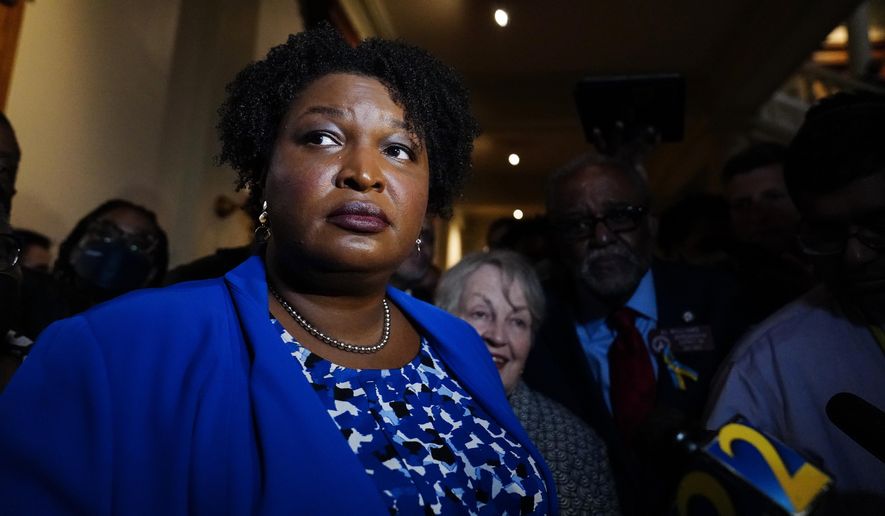BRUNSWICK, Ga. — Presumptive Democratic gubernatorial nominee Stacey Abrams is betting her commitment to fully expanding Medicaid is going to help her do something she failed to do four years ago: become the nation’s first black female governor.
The pledge is part of a broader message Ms. Abrams is delivering to voters that plants her squarely on the side of progressives in the nationwide battles over health care, guns, schools, transgender athletes and election laws.
Ms. Abrams is hoping to draw a bright line of contrast between herself and Gov. Brian Kemp, the Republican who defeated her four years ago and who is confident he can do it again.
“I have been racking my brain trying to imagine what is preventing Brian Kemp from expanding Medicaid, what is preventing Brian Kemp from doing what he knows to be right,” Ms. Abrams told a few hundred supporters gathered at Veterans Memorial Park in this coastal town in southwest Georgia. “The truth of the matter is I think it is the simplest explanation that we learn when we are young: Brain Kemp just doesn’t care.”
She hammered Mr. Kemp for being coldhearted.
“If you care about the people of Georgia you expand Medicaid,” she said.
Georgia is one of 12 states that has not expanded Medicaid, which helps low-income people get health care as part of Obamacare.
Mr. Kemp has sought a more limited expansion. He requested a Medicaid waiver from the Trump administration that called for an 80-hour-a-month work requirement, but the Biden administration scuttled the plan earlier this year.
Kemp spokesman Tate Mitchell said Ms. Abrams’ attacks are misguided and said the governor has been working with GOP lawmakers to pass legislation that expands health care access and lowers costs.
“Unfortunately, the Biden Administration and Stacey Abrams are playing politics with those waivers and demanding Georgians remain trapped in a broken government system,” Mr. Mitchell said. “To expand Medicaid would eventually cause Georgians’ taxes to go up in order to foot the bill.”
Ms. Abrams, who is a former minority leader in the Georgia legislature and voting rights activist, didn’t draw a primary opponent in her second bid for governor and avoided a grueling primary like the one four years ago.
Mr. Kemp wasn’t so lucky.
Former President Donald Trump, who endorsed Mr. Kemp in 2018, turned on the governor after he refused to embrace claims that Democrats stole the 2020 presidential election in Georgia.
Mr. Trump recruited former Sen. David Perdue to run against Mr. Kemp in the primary, splintering Georgia Republicans.
Mr. Kemp, nonetheless, is running strong.
Polls suggest he could have enough support to wrap up the GOP nomination in the May 24 primary and avoid a runoff race. He has been busy in recent weeks signing a series of bills into law that are popular with the conservative base, including allowing Georgians to carry concealed handguns without a permit.
In a poke at his primary rival, Mr. Kemp went to the White Diamond Grill in Bonaire, Georgia — one of Mr. Purdue’s favorite restaurants — to sign a bill that gradually cuts the state income tax from 5.75% to 4.99% by the end of the decade.
It could end up being the largest tax cut in the state’s history.
Mr. Kemp has also signed a package of education bills that would regulate the teaching of race in the classroom and allow the state athletic association to ban transgender girls from playing high school sports.
The moves have bolstered his image with the Republican base and infuriated Democrats.
Ms. Abrams said Mr. Kemp’s flurry of recent activity is an attempt to beat back the challenge from Mr. Perdue, who is trying to outflank him on his right.
“Brian Kemp has decided that it is easier to win a primary by saying it is OK to lie to our children,” she said. “He has decided he wants our teachers to be in a courtroom rather than a classroom.”
“When you are willing to ban [trasngender] children instead of bending to bring them inside, you do not deserve to be in charge of the state of Georgia,” Ms. Abrams said.
• This article is based in part on wire reports.
• Seth McLaughlin can be reached at smclaughlin@washingtontimes.com.




Please read our comment policy before commenting.